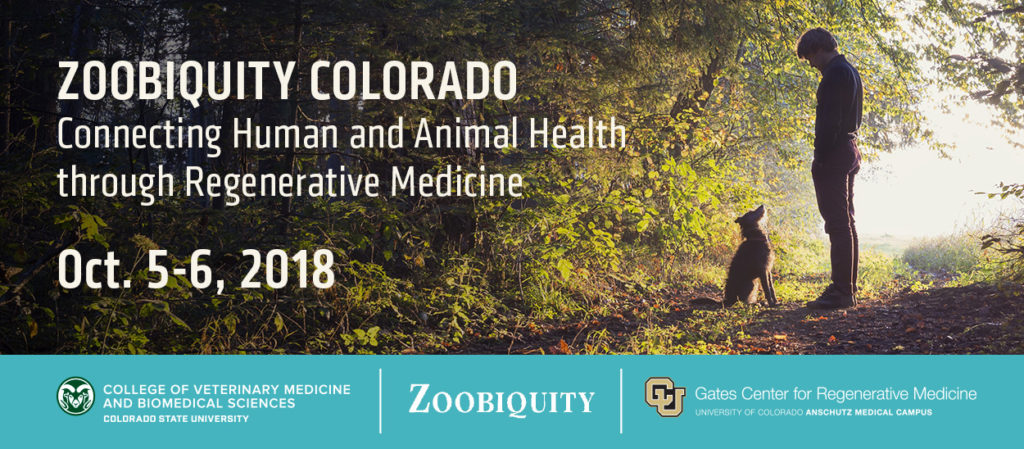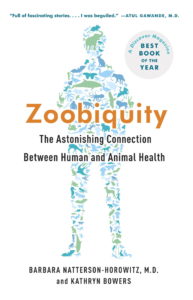
Zoobiquity Colorado: Connecting human and animal health through regenerative medicine is a two-day conference that will take place at the University of Colorado Anschutz Medical Campus and Colorado State University Oct. 5 and 6. This national meeting, focusing on regenerative medicine advances, is built on a One Health concept designed to bring together leading clinicians and scientists in human and veterinary medicine.
Zoobiquity Colorado will highlight the laboratory and clinical research of human and veterinary investigators and foster ongoing and future collaborations. Researchers at CSU and CU Anschutz have collaborations that include clinical trials at CSU’s James L. Voss Veterinary Teaching Hospital, and multiple studies in the CU Cancer Center and the Gates Center for Regenerative Medicine that involve natural animal models.
The program will consist of a half-day field trip to Fort Collins and tours of CSU research laboratories, followed by a full day of case presentations and panel discussions on the Anschutz Medical Campus in Denver. Busing between campuses and meals will be provided. Find more information on the Zoobiquity Colorado conference site.
Topics and speakers
- Regenerative medicine approaches to cancer, wound healing, orthopedics, and ophthalmology
- The regulatory environment in human and animal research
- Perspectives from the Federal Drug Administration
- Thought leaders in regenerative medicine
- Faculty from the CSU College of Veterinary Medicine and Biomedical Sciences, and the University of Colorado School of Medicine
About Zoobiquity
Coined by Dr. Barbara Natterson-Horowitz and Kathryn Bowers in their 2012 book, “Zoobiquity: The Astonishing Connection Between Human and Animal Health,” zoobiquity comes from the Greek for “animal,” zo, and the Latin for “everywhere,” ubique.
Animals and humans share the planet, and they have many illnesses in common: cancer, arthritis, organ failure, injuries, and toxicities. In the past, the art and science of medicine was practiced across species because human and domestic animals were so co-dependent. But as humans have lived farther from their livestock and food-source wildlife, a gulf has opened between veterinary medicine and human medicine.
Zoobiquity seeks to bridge that gulf. Founded in 2011, Zoobiquity Conferences are designed to bring together leading clinicians and scientists in human and veterinary medicine to discuss the same diseases in a wide spectrum of animal species and human beings. The intention of this cross-disciplinary conference is to create conversations and relationships between human and veterinary colleagues confronted with similar clinical challenges. By crossing disciplines in this way, we can significantly expand the perspective of clinicians, scientists and patients about these shared disorders and broader health concerns.
In the case of regenerative medicine, this cutting-edge field is already familiar to veterinarians. The regulatory constraints prohibiting the use of certain stem cell therapies in humans have not hindered veterinary researchers, who have been using these therapies for two decades in equine patients. These treatments have been reimbursed by equine health insurance companies, as their effectiveness has been demonstrated and measured in horses.
About the Gates Center for Regenerative Medicine
The Gates Center for Regenerative Medicine was established in 2006 with a gift in memory of Denver industrialist and philanthropist, Charles C. Gates, who was captivated by the hope and benefit stem cell research promised for so many people in the world. The Gates Center aspires to honor what he envisioned—by conducting leading-edge research in stem cell biology and regenerative medicine to accelerate discoveries from the lab through clinical trials leading to effective cures and therapies for patients.
Led by Founding Director Dennis Roop, Ph.D., the Gates Center is located at the University of Colorado’s Anschutz Medical Campus, the only comprehensive academic health sciences center in Colorado, the largest academic health center in the Rocky Mountain region and one of the newest education, research and patient care facilities in the world.
The Gates Center shares its services and resources with a growing membership of researchers and clinicians at the Anschutz Medical Campus, which includes University of Colorado Hospital, Children’s Hospital Colorado and the future Veterans Administration Medical Center, as well as the Denver and Boulder campuses, National Jewish Health, Colorado State University, the Colorado School of Mines, and business startups. This collaboration is designed to draw on the widest possible array of scientific exploration relevant to stem cell technology focused on the delivery of innovative therapies in Colorado and beyond.
Among the Gates Center’s services and resources is the Gates Biomanufacturing Facility, one of six combined cell therapy and protein manufacturing facilities in the United States and the only one of its kind within an 800-mile radius.
About the University of Colorado School of Medicine
Faculty at the University of Colorado School of Medicine work to advance science and improve care. These faculty members include physicians, educators and scientists at University of Colorado Hospital, Children’s Hospital Colorado, Denver Health, National Jewish Health, and the Denver Veterans Affairs Medical Center. The school is located on the Anschutz Medical Campus, one of four campuses in the University of Colorado system. To learn more about the medical school’s care, education, research and community engagement, visit its web site.
About the CSU College of Veterinary Medicine and Biomedical Sciences
The mission of the CSU College of Veterinary Medicine and Biomedical Sciences is to improve the health of animals, people, and the planet through innovative and dedicated teaching, research, outreach, and clinical service. Through our actions, we empower the next generation of leaders to change the world.
Founded in 1907, and home to the highly ranked Doctor of Veterinary Medicine program, the college also educates undergraduates in biomedical sciences, environmental health and radiological sciences, microbiology, immunology and pathology, and neuroscience.
One of Colorado State’s most productive research units, the college’s research expenditure in 2017 was $44 million, driving discoveries in human and animal health.
The James L. Voss Veterinary Teaching Hospital treats more than 40,000 patients a year, and is home to the Flint Animal Cancer Center, and 79 faculty veterinarians representing 28 board-certified specialties. Veterinary students spend the third and fourth years of their doctoral program on clinical rotations in the hospital.
Scheduled to open in late fall 2018, the C. Wayne McIlwraith Translational Medicine Institute will draw on established areas of CSU research expertise in orthopaedics, biomedical engineering, immunology, infectious disease, surgical advances, and other medical fields. The institute will bring together educators and innovators from academia, industry, public agencies, and other entities to pursue development of promising medical technologies. Its state-of-the-art equipment, research space, clinical resources, and conference areas are designed to support this collaboration among animal and human medical specialists.